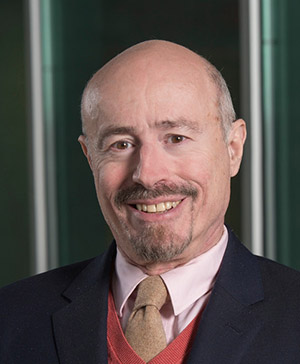_5.jpg)
Richard Kauzlarich
Was President Donald Trump a shrewd operator at the recent NATO summit, or was his bluster part of an attempt to undermine the post-World War II political and economic order?
George Mason University professors made arguments on both sides of the ledger after two days in which Trump scolded some of the United States’ NATO allies for not spending more on defense.
“The whole imagery of what’s going on is horrible for the United States,” said Richard Kauzlarich, a Distinguished Visiting Professor at Mason’s Schar School of Policy and Government and a former U.S. ambassador. “I don’t know that this has strengthened the alliance, as he claims. I think he has weakened it. This is not the way you get things done diplomatically.”
Schar School professor Hilton Root, a policy specialist in international political economy and development, offered a different view: “The president just feels we are carrying a much heavier burden than we have in the past, and it’s not fairly distributed. He’s trying to move [NATO] forward, not necessarily destroy it, by making it into something relevant to our security needs we see unfolding in the next 10 or 15 years.”
For Root, that means broadening NATO’s focus to include security concerns in Central Asia and the Middle East while remaining a counterweight to Russia in Europe.
“What Russia is doing now is exploiting the West’s inability to cover the Middle East because NATO doesn’t cover that,” Root said. “Russia, which has trivial military capabilities compared to NATO, is able to exploit the situation because NATO doesn’t want to commit to a serious long-term security package for the Middle East.”
“[Russian President Vladimir] Putin has the upper hand right now because NATO is ineffective with dealing with regions that are crucial but not traditional areas it is involved in,” Root said. “That’s what Trump is trying to say, and I think he will persuade them in the long run because he is right.”

Hilton Root
Kauzlarich, a former ambassador to Azerbaijan, Bosnia and Herzegovina who also was deputy assistant secretary of state for European affairs during George H. W. Bush’s presidency, agreed that the United States should keep the pressure on its NATO allies.
“There are countries who can spend more and should spend more,” he said. “But this is not the way to do it. It’s going to be very hard for political leaders in Europe to go back to their parliaments and explain why they should pay more for defense when you’ve got the president of the United States essentially attacking them and threatening to undermine NATO, if not, according to some reports, withdrawing from the alliance entirely. Putin could not have asked for a better outcome where you have allies divided against the U.S. and against each other.”
Root dismisses those who believe Trump is doing Putin’s bidding.
“If [Trump] succeeds, that will be a counterforce to Putin,” he said. Regarding Trump’s NATO strategy, Root added, “He’s trying to give them a wake-up call by saying, ‘If this thing is going to work and continue to be valid for our interests, then it has to be designed in such a way [so that] it is a more full-fledged global operation and not just focused on European security.’ ”
Root does wonder, though, if Trump can act diplomatically enough to secure the changes he wants.
Richard Kauzlarich can be reached at 703-993-9652 or rkauzlar@gmu.edu.
Hilton Root can be reached at 703-993-9027 or hroot2@gmu.edu.
For more information, contact Damian Cristodero at 703-993-9118 or dcristod@gmu.edu.
About George Mason
George Mason University is Virginia’s largest public research university. Located near Washington, D.C., Mason enrolls more than 36,000 students from 130 countries and all 50 states and Washington, D.C. Mason has grown rapidly over the past half-century and is recognized for its innovation and entrepreneurship, remarkable diversity and commitment to accessibility.
